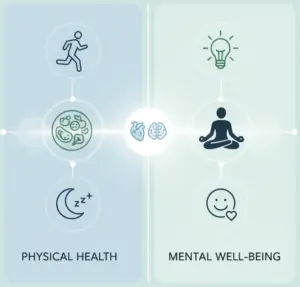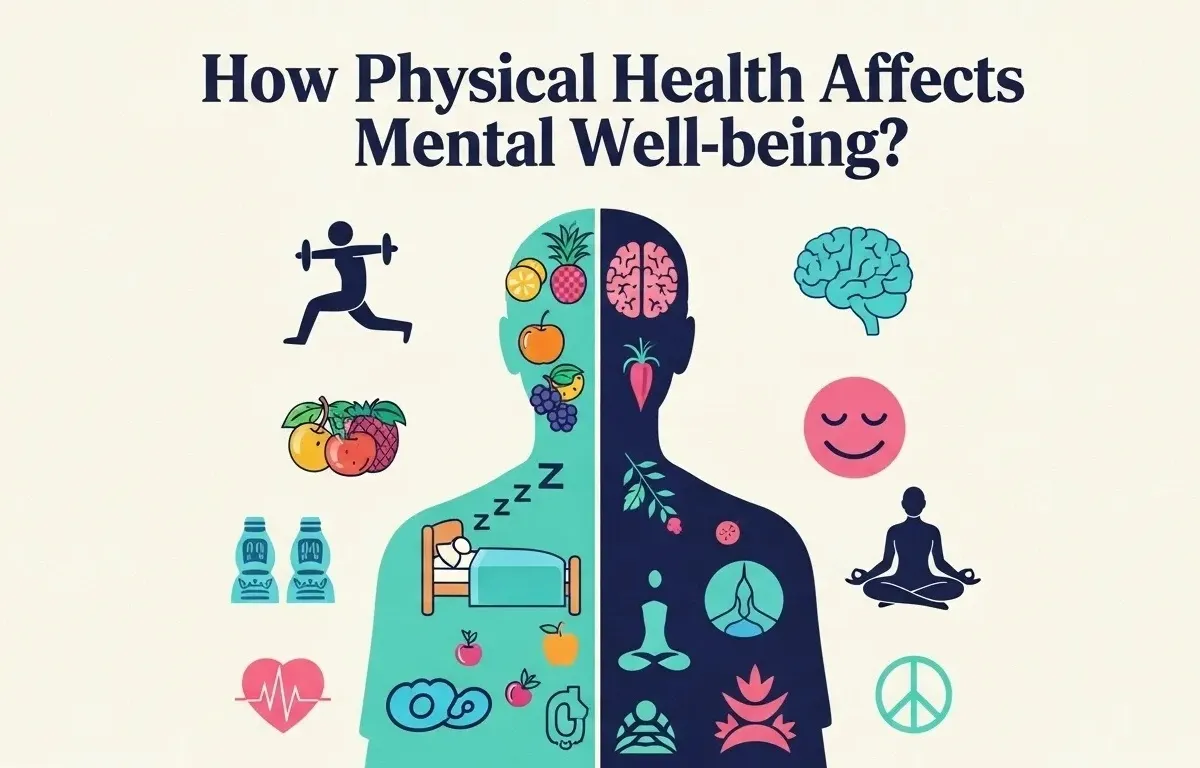We often think of physical health and mental health as two separate things. In reality, the body and mind are closely linked. When our body struggles, our mind often feels the effects—and the other way around. This relationship is called the mind-body connection.
Understanding this connection can help us care for our overall well-being. By looking at how physical health shapes our emotions and thoughts, and vice versa, we can use everyday habits to create balance and resilience.
How the Mind and Body Communicate?
Our brain and body are in constant conversation. The nervous system, hormones, and immune system all play a role in connecting physical experiences to emotional states.
For example:
Stress triggers the release of cortisol, which increases heart rate and blood pressure.
Poor sleep affects brain chemicals like serotonin and dopamine, which regulate mood.
Chronic illness can lead to sadness or frustration, while depression can worsen physical pain.
This is why psychosomatic symptoms—physical symptoms caused or worsened by emotional distress—are so common. Headaches, stomach problems, and muscle tension can sometimes be the body’s way of showing that the mind is under strain.
Sleep & Mood: A Two-Way Street:
Sleep is one of the clearest examples of the mind-body connection. Anyone who has stayed up too late knows how much it can affect mood the next day.
Lack of sleep can make us irritable, anxious, or emotionally sensitive.
Chronic sleep deprivation is linked to higher risks of depression and anxiety
Mental health struggles such as stress or trauma often make it harder to sleep.
This cycle of poor sleep & mood can be broken with healthy sleep habits. Keeping a consistent bedtime, limiting screen use before bed, and creating a calming routine all support better rest—and a more balanced mind.
Psychosomatic Symptoms: When Emotions Show Up in the Body
Many people are surprised by how much emotional stress shows up in physical form. Psychosomatic symptoms can include:
Headaches or migraines
Digestive issues (like nausea, bloating, or stomach pain)
Muscle tension or back pain
Fatigue without clear medical cause
These symptoms are real, not “imagined.” They happen because the body reacts to prolonged stress or unresolved emotions. Recognizing this link helps us treat both the body and the mind, rather than focusing on one alone.

The Role of Lifestyle Medicine:
Lifestyle medicine focuses on how everyday choices—such as diet, exercise, sleep, and stress management—affect both physical and mental well-being. Instead of relying only on medications, it encourages habits that strengthen the mind-body connection.
Key areas of lifestyle medicine:
Nutrition – Eating a balanced diet supports brain function, energy levels, and mood. For example, omega-3 fatty acids may reduce depression symptoms.
Exercise – Movement releases endorphins, which naturally lift mood and reduce anxiety.
Sleep – Prioritizing rest helps regulate emotional balance.
Stress reduction – Practices like meditation, yoga, or deep breathing calm both mind and body.
Healthy relationships – Positive social connections boost resilience and lower stress.
By combining medical care with these lifestyle changes, people often see improvements in both physical health and emotional well-being.
Everyday Practices to Strengthen the Mind-Body Connection:
Here are some simple steps anyone can try to nurture both body and mind:
Mindful movement: Activities like walking, yoga, or tai chi help reduce tension while improving focus.
Breathing exercises: Deep breathing signals the body to relax, lowering heart rate and easing anxiety.
Journaling: Writing about emotions helps process stress, which can reduce physical tension.
Balanced routines: Keeping a steady schedule for eating, sleeping, and relaxing helps regulate mood and energy.
Limiting stimulants: Reducing caffeine or alcohol can improve sleep and emotional stability.
When to Seek Help:
If physical symptoms or emotional struggles persist, professional support may be needed. A doctor can rule out medical issues, while a therapist can help explore underlying stress or trauma contributing to psychosomatic symptoms.
Integrated care—where healthcare providers address both physical and mental health—is often the most effective way to heal.
Final Thoughts:
The mind-body connection shows us that health is not just about treating symptoms—it’s about caring for the whole person. Sleep, stress, diet, and movement all shape how we feel mentally and physically.
By paying attention to sleep & mood, understanding psychosomatic symptoms, and embracing principles of lifestyle medicine, we can create a more balanced path to well-being—contact us, we will help you.


